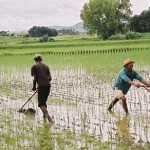 Napoleon famously said that an army marches on its stomach, but whilst the more progressive organizations out there do attempt to provide their troops with a steady flow of good, nutritious food, it’s perhaps fair to say that they haven’t taken Napoleon quite to heart. Some new research suggests however that food may play a much bigger role in the collaborative potential of our employees.
Napoleon famously said that an army marches on its stomach, but whilst the more progressive organizations out there do attempt to provide their troops with a steady flow of good, nutritious food, it’s perhaps fair to say that they haven’t taken Napoleon quite to heart. Some new research suggests however that food may play a much bigger role in the collaborative potential of our employees.
Now, I’m not talking about modern constructs such as Lunch Roulette, named after the controversial Chat Roulette, and which pairs up random people within your organization for a lunch date. No, I’m talking more about the very roots of our cultural being. The same kind of roots that I explored last month with a couple of posts on Geert Hofstede’s power distance work.
For those of you that aren’t familiar with power distance, it’s an index along which countries are placed that determines their various attitudes towards power and so on. For instance, in small power distance cultures, initiative is expected from everyone, whereas in large power distance cultures, initiative is something only expected from those in power. There are numerous attitudes explored in the index, but you get the broad idea.
So, how does food play into all of this? Well, a recent study led by Thomas Talhelm of the University of Virgina has explored the role food, or more specifically the type of crop typically grown, plays on how we behave. The basis for the study was born out of a desire to understand more the difference between cultures, and in particular between orientals and occidentals, or more broadly between some of those on the small power distance side of the index and those on the large power distance side.
Having tried, and eliminated, various hypothesis, from modernisation to disease, the researchers tried looking at the type of crop grown (historically). In the West, the staple crop is wheat, whilst in the East it’s rice. Before modern farming brought machines into play, the poor farmer growing rice would expend around twice as much time tending his crop as his wheat growing peer.
The research suggests, that this resulted in a requirement that rice farmers develop, and engage in, co-operative labour exchanges, thus allowing each farmer to assist their neighbours during the critical planting and harvesting periods.
To test their hypothesis, the researchers gathered 1,200 volunteers from across China to answer questions assessing their individualism vs their collectivism. China was chosen partly because it represents a single national culture, but also because whilst large chunks of the country still grow predominantly rice, there are pockets that grow predominantly wheat.
The answers bore little relation to the wealth of a volunteer’s place of origin, which Mr Talhelm saw as a proxy for how modern it was, or to its level of public health. There was a striking correlation, though, with whether it was a rice-growing or a wheat-growing area.
Now, it goes without saying that this is undoubtedly a big and bold hypothesis, but it is certainly an interesting one nonetheless, and may help us delve deeper into some of the things that underpin our national cultures.
We are what we eat. And we become what we think. Globally, our food habits with industrial food has begun to convert man into an unfeeling, unthinking, emotionally crippled, unsocial, bigoted being. Think about it.